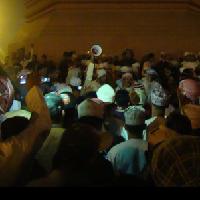
Police kill demonstrators – workers block oil port
On 16 February, the Middle East revolt reached Oman. Hundreds of people came out in protest against corruption and social injustice. Since then, daily demonstrations have grown into a mass movement in the main industrial city of Sohar.
Sultan Qaboos has ruled Oman for over 40 years, since 1970. He is a close friend of the United States, which has military bases in the country. He rules the country as an absolute monarch. No political parties are allowed, only a fake senate assembly.
The sultan’s first response to the demonstrations was to apply some changes to his appointed government. One minister was replaced, but it did not calm the situation. The response from the masses was bigger mobilisations and stronger demands.
On late Saturday, 26 February, doctors said six people were killed and tens injured during protests. As a reply from the protesters, on Sunday, a police station was burned down. In a speech, the following day, the Sultan, fearing the rage of the masses, promised 50,000 jobs and an unemployment benefit of 390 US dollars a month to Omani people, but not for the 800,000 strong foreign labour force working in the country. Oman has 2,845,000 inhabitants, including migrant labour.
The Sultan also announced a new committee to oversee the power of the Senate. But his promised changes did not stop the movement. On Monday, protesters blocked the port of Sohar, the second largest, which is mainly used for exporting oil from Oman. (The country is an important oil producer, with 850,000 barrels a day). Protesters demand jobs, democratic reforms, higher wages and the prosecution of the officers behind the killings of demonstrators. Access to the industrial area, including an oil refinery and an aluminium factory, was blocked by protesters. A supermarket near the port was looted and burned down.
The protests have now spread to the capital, Muscat, and other cities.
The movement in Sohar is a working class movement, against unemployment and low wages. The movement in Oman underlines the regional spread of mass protests fighting for democratic rights and social justice. In Oman, as in other neighbouring countries, a key task facing working people is to make up for the lack of independent trade unions and mass workers’ organisations by building such forces, including a party of the working class, with socialist policies to offer a real alternative to despotism and capitalism.

Be the first to comment